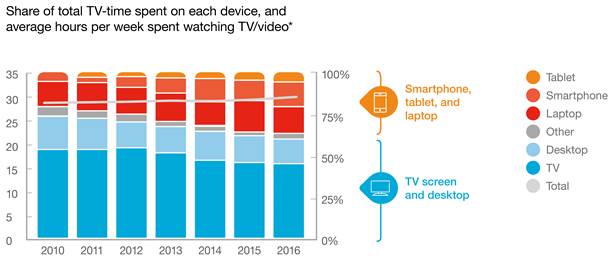- Ericsson ConsumerLab TV & Media Report, representing views of 1.1 billion consumers, reveals massive scale of growth in mobile video viewing
- Weekly share of time spent watching TV and video on mobile devices has grown by 85 percent in the last six years
- US consumers rate Video on Demand (VOD) services higher than broadcast TV, despite spending substantially more time (45 percent) choosing what to watch when using them
Ericsson (NASDAQ: ERIC) today launched the seventh edition of its annual ConsumerLab TV & Media Report, which details the enormous and rapid shift in TV and video viewing behavior towards mobility. The report also shows that while both mobile video and on-demand TV viewing have soared over the past seven years, content discovery remains a huge frustration for consumers.
Continued shift to mobile:
Average viewing times on mobile devices has grown by more than 200 hours a year since 2012, driving up overall TV and video viewing by an additional 1.5 hours a week. The surge in mobile viewing is offset with a decline in fixed screen viewing of 2.5 hours a week, however the appetite for TV and video is not waning.
- Weekly share of time spent watching TV and video on mobile devices has grown by 85 percent (2010-2016); on fixed screens it has gone down by 14 percent over the same period
- 40 percent of consumers globally are ‘very interested’ in a mobile data plan that includes unrestricted video streaming
- In the US, 20 percent of mobile viewing is paid-for content using services such as Netflix, Hulu, and Amazon Prime
Content discovery – how hard can it be?
A major issue, highlighted by the report, is low consumer satisfaction when trying to find something to watch. 44 percent of US consumers say they can’t find anything to watch on linear TV on a daily basis, an increase of 22 percent compared with last year (36 percent). In contrast, US consumers spend 45 percent more time choosing what to watch on VOD services than linear TV.
Paradoxically, 63 percent of consumers claim that they are very satisfied with content discovery when it comes to their VOD service, while only 51 percent say the same for linear TV. The findings suggest that although the VOD discovery process is more time consuming than with linear broadcast TV, consumers rate it as less frustrating, as it implicitly promises the opportunity to find something they want to watch, when they want to watch it.
Popularity of on-demand services soars:
The total viewing time of on-demand content – such as streamed TV series, movies and other TV programs – has increased 50 percent since 2010. Strong indicators of this growing engagement and satisfaction with VOD services include:
- Consumers continue to embrace binge watching; 37 percent watch two or more episodes of the same show in a row on a weekly basis, more than a fifth say they do this daily
- Consumer spending on VOD services in the US has increased by over 60 percent since 2012, from $13 to $20 per month
- 40 percent of respondents say they watch YouTube daily; a substantial 10 percent of consumers say they watch YouTube for more than three hours a day
Zeynep Ahmet, Senior Advisor, Ericsson ConsumerLab says: “Based on our extensive research, we can see consumers increasingly ask for seamless access to high quality TV and video content, across services and devices. For consumers in general, and millennials in particular, being able to watch on the smartphone is key. Consumers not only want the shared, social broadcast TV experience, they also expect the flexibility of an à la carte on-demand media offering. Today’s experience is multifaceted and consumers want to create their own worlds of compelling, personalized content.”



















